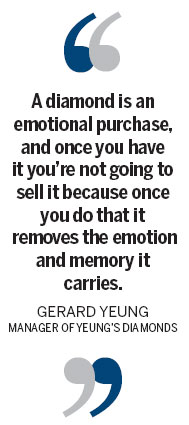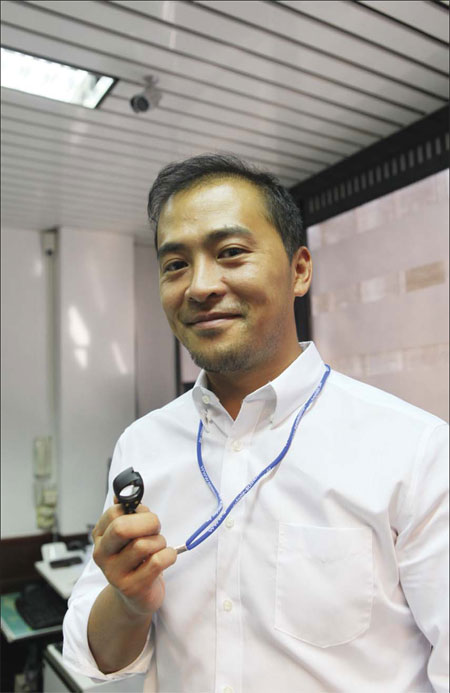Gem-studded road to freedom
Updated: 2013-09-06 09:30
By Tuo Yannan (China Daily)
|
|||||||||||
A Belgium-born businessman appreciates the role precious stones have played in his life
No two diamonds are exactly the same, and the same might be said of what people see in them. When Gerard Yeung looks at the precious stones they represent freedom - the freedom of following a career of his choosing.
Yeung was born to a Hong Kong family in Antwerp in 1978 and his father, Kam-Loy Yeung, was a mechanical engineer.
Like many Chinese in Belgium in the 1980s, his mother's family was in the restaurant business, and Yeung, the youngest of three children, eventually had to work in the restaurant every day after school and during holidays.
For that reason he could not play with schoolmates and he only ever got days off when the business was closed for holidays, he says.
However, a phone call from Hong Kong in 1981 changed his life. It was a friend of Yeung senior asking whether he could buy some diamonds for him.
Before long, Kam-Loy Yeung had not only bought diamonds but was buying and selling them, breaking into a business traditionally dominated by Jews.
After that, whenever the family restaurant was closed for holidays, there was another place for Gerard Yeung to spend his days - in the tiny office of his father's diamond business.

He still recalls what he thought when he first saw a diamond there. "It wasn't the reaction of most people when they see a diamond. I just thought, 'So this is what my father is selling'."
When no one else was there, his father would take out 10 diamonds and ask him to tell him which ones were the best.
"Before I was 12, for me and my father they were more like a game."
Thanks to that early start in the business, he says he can now check and grade up to 8,000 diamonds a day. "It only takes me a few seconds to grade a diamond."
When he was old enough to attend high school, he had to choose between the restaurant and the diamond business, he says. "I stayed in the diamond business because I found working in the restaurant very restrictive. Diamonds opened the doors to the outside world."
He is the only one of three children still in the business.
Entering that "outside world" included going to Brussels after he left high school to study jewelry design. Those studies took place in the evening, and by day Yeung held down a part-time job in a restaurant.
After three years' study he joined his father's company in Antwerp, which moved into a bigger office.
A huge traditional Chinese wooden plaque on which is inscribed "Yeung's Diamonds" in Chinese is the first thing you see when you enter the office. A fish tank with two big fish swimming around that sits under the sign is also a traditional Chinese symbol of good fortune.
Yeung says they remain typical old-school Hong Kong businessmen and treasure tradition. Two microscopes sit on a desk ("One is my father's and the other is mine"), and two Chinese paintings hang on the wall behind the desk.
Even with the skills picked up when he was young, it took a long time to establish himself in the industry, he says. One reason is that in the Antwerp diamond industry a piece of paper with a company director's signature can represent a diamond worth hundreds of thousands of dollars, so trust is a precious asset that can only be developed over many years, he says.
Through many years of hard work, Yeung's family built up a good reputation in the city and formed solid ties with the Jewish community.
When his father founded the company more than 30 years ago most customers were from Hong Kong, he says.
"As the company has been built up we have attracted customers from all over Asia."
He sees his father as the company's founder and himself as an "explorer" because around 1995 he expanded the business to the Chinese mainland, which now accounts for 85 percent of its sales.
In Hong Kong, the market is limited to specific ranges of diamonds, whereas in the mainland, demand is broader, he says.
In 2011 the company opened a branch in the Shanghai Diamond Exchange.
"Last year our Hong Kong office was able to draw on Hong Kong's economic advantages and we plan to open an office in Shenzhen to deepen our relationship with local manufacturers."
Sales of luxury goods in Hong Kong have risen more than 30 percent this year, he says, and he believes the company can cash in on the next sales surge.
Over the next few years, the company will target China's second and third-tier cities, where many jewelry shops will open, presenting opportunities for the Antwerp diamond industry, he says.
His confidence in the Chinese market stretches beyond faith in its growing middle class. Many Chinese are now starting to buy diamond as an investment, he says.
"A diamond is an emotional purchase, and once you have it you're not going to sell it because once you do that it removes the emotion and memory it carries."
On the other hand, those who hold on to their precious stone remain prospective investors, he says, because once they have more money to spend they will go out and buy something bigger, while keeping their first buy.
tuoyannan@chinadaily.com.cn
|
Thanks to an early start in the business, Gerard Yeung can check and grade up to 8,000 diamonds a day. Tuo Yannan / China Daily |
(China Daily European Weekly 09/06/2013 page22)
Today's Top News
List of approved GM food clarified
ID checks for express deliveries in Guangdong
Govt to expand elderly care
University asks freshmen to sign suicide disclaimer
Tibet gears up for new climbing season
Media asked to promote Sino-Indian ties
Shots fired at Washington Navy Yard
Minimum growth rate set at 7%
Hot Topics
Lunar probe , China growth forecasts, Emission rules get tougher, China seen through 'colored lens', International board,
Editor's Picks

|

|

|

|

|

|






